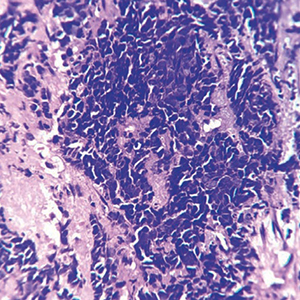Detection of clinically-relevant EGFR variations in de novo small cell lung carcinoma by droplet digital PCR

Submitted: March 29, 2022
Accepted: August 2, 2022
Published: September 2, 2022
Accepted: August 2, 2022
Abstract Views: 1026
PDF: 416
Publisher's note
All claims expressed in this article are solely those of the authors and do not necessarily represent those of their affiliated organizations, or those of the publisher, the editors and the reviewers. Any product that may be evaluated in this article or claim that may be made by its manufacturer is not guaranteed or endorsed by the publisher.
All claims expressed in this article are solely those of the authors and do not necessarily represent those of their affiliated organizations, or those of the publisher, the editors and the reviewers. Any product that may be evaluated in this article or claim that may be made by its manufacturer is not guaranteed or endorsed by the publisher.
Similar Articles
- Halil Yanardag, Cuneyt Tetikkurt, Muammer Bilir, Clinical and prognostic significance of muscle biopsy in sarcoidosis , Monaldi Archives for Chest Disease: Vol. 88 No. 1 (2018)
- G.L. Casoni, C. Gurioli, P.N. Chhajed, M. Chilosi, M. Zompatori, D. Olivieri, V. Poletti, The value of transbronchial lung biopsy using jumbo forceps via rigid bronchoscope in diffuse lung disease , Monaldi Archives for Chest Disease: Vol. 69 No. 2 (2008): Pulmonary series
- H. Halilcolar, S. Yapicioglu, S. Bilaceroglu, Temporal Changes in Lung Cancer: A 10-year Study in a Chest Hospital , Monaldi Archives for Chest Disease: Vol. 69 No. 4 (2008): Pulmonary series
- Ivan Comelli, Alessandra Bologna, Andrea Ticinesi, Andrea Magnacavallo, Denis Comelli, Tiziana Meschi, Gianfranco Cervellin, Incidence of primary spontaneous pneumothorax is not associated with microclimatic variations. Results of a seven-year survey in a temperate climate area , Monaldi Archives for Chest Disease: Vol. 87 No. 1 (2017)
- Rajesh Venkataram, Srividya Arjuna, Giridhar Belur Hosmane, Anirban Chakraborty, Quantitative analysis of cell-free DNA by droplet digital PCR reveals the presence of EGFR mutations in non-malignant lung pathologies , Monaldi Archives for Chest Disease: Vol. 91 No. 3 (2021)
- Halil Yanardag, Cuneyt Tetikkurt, Muammer Bilir, Erkan Yılmaz, Association of HLA antigens with the clinical course of sarcoidosis and familial disease , Monaldi Archives for Chest Disease: Vol. 87 No. 3 (2017)
- Ritu Kulshrestha, Himanshi Saxena, Raj Kumar, Sonam Spalgais, Parul Mrigpuri, Nitin Goel, Balakrishnan Menon, Meenu Rani, Pawan Mahor, Ishita Bhutani, Subtyping of advanced lung cancer based on PD-L1 expression, tumor histopathology and mutation burden (EGFR and KRAS): a study from North India , Monaldi Archives for Chest Disease: Vol. 93 No. 4 (2023)
- Rakesh Behera, Sheetal Arora, Pranav Ish, Geetika Khanna, Common epidermal growth factor receptor mutations in north Indian patients with non-small cell lung carcinoma: evidence from real-time polymerase chain reaction , Monaldi Archives for Chest Disease: Early Access
- Manu Madan, AJ Mahendran, Rohit Kumar, Yash Kedia, Rajnish Kaushik, Pranav Ish, Shibdas Chakrabarti, Neeraj Kumar Gupta, Nitesh Gupta, Comparative yield of transbronchial cryo-nodal biopsy, transbronchial intra-nodal forceps biopsy, and transbronchial needle aspiration for mediastinal lesions at a tertiary care center in India (COLD-FORCEPS study) , Monaldi Archives for Chest Disease: Early Access
- Yoldez Houcine, Chirine Moussa, Ahmed Ben Abdelaziz, Aida Ayadi, PDL1 and molecular biomarkers expression in non-small cell lung cancer in Tunisian patients , Monaldi Archives for Chest Disease: Early Access
You may also start an advanced similarity search for this article.

 https://doi.org/10.4081/monaldi.2022.2280
https://doi.org/10.4081/monaldi.2022.2280





